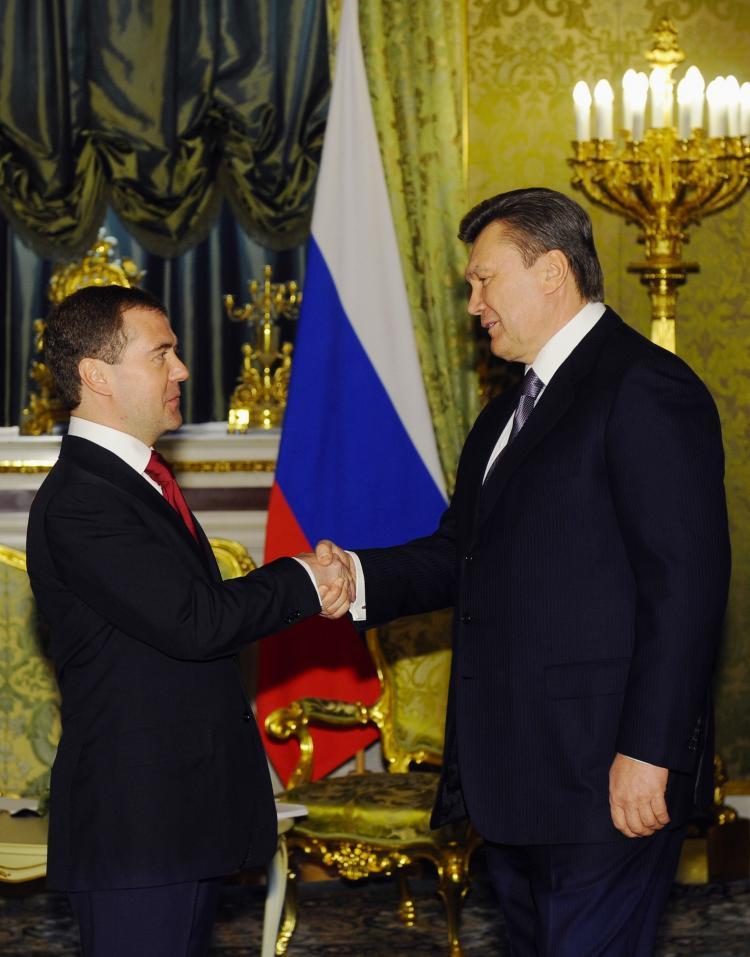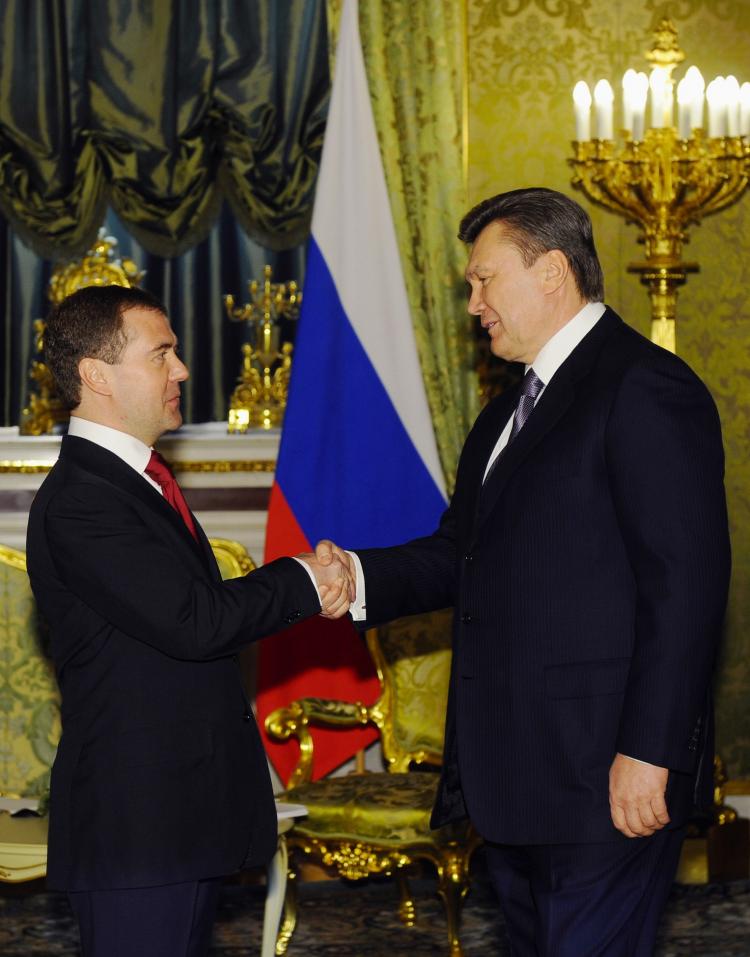KYIV, Ukraine—Ukraine and Russia share a common history, but since the collapse of the Soviet Union and Ukraine’s independence, the two countries have taken different paths. The question is whether that divide is now shrinking.
Igor Chubais, director of the Center of Russian Studies at the People’s Friendship University of Russia in Moscow, says the two countries take very different approaches to the past.
“Ukraine is moving toward exposing Stalinist terror, but Russia is on the way of restoring the Stalinist ideal,” says Chubais.
Moscow authorities are planning to paste Joseph Stalin’s image on billboards for the May celebration of the 65th anniversary of the Soviet Union’s victory in World War ll.
Ukraine concertedly let go of its leftover past during Victor Yushchenko’s presidency over last five years. He put all his efforts into making secrets from the past widely known. Various groups have organized efforts to unveil the crimes of the Communist regime. The Security Service of Ukraine (SSU) has also exposed the facts of the terror that happened on Ukrainian soil, in particular, the 1932-33 famine.
During Yushchenko’s tenure, the media became much freer and as the number of political parties proliferated, more political forces came on the scene to defend their interests.
But Russia has a different situation under Prime Minister Vladimir Putin’s United Russia Party dominating in the country and seeing Ukraine as the loser because the financial and political crisis over the last several years have yielded a stifling struggle between political rivals—former President Yushchenko and former Prime Minster Yulia Tymoshenko.
Igor Chubais considers Russia’s current policy as mainly authoritarian but not yet totalitarian.
“Authoritarian regimes keep some channels unblocked and so there remains minor opportunities to express yourself, shape your position, and your viewpoint,” says the political scientist.
In those “unblocked channels” are human rights organizations and small groups of citizens who join together to protect the civil rights. But the Kremlin oppresses them, trying to ban peaceful public demonstrations all over the country.
Ukrainian local authorities are far fairer on this issue.
“The Ukrainian perspective is very important for us. What happens in Ukraine today, is in Russia tomorrow,” said Chubais.
In January, the Kyiv Court of Appeal posthumously convicted communist leaders Stalin and Molotov for engineering the 1932-33 famine, classifying it as “genocide” toward Ukrainian people in Ukraine.
The decision came from criminal proceedings initiated by the SSU last May. According to official estimates, from 3 million to 7 million people died during the famine in Ukraine.
Earlier, the Parliament of Ukraine had recognized the famine as genocide. A resolution supported in 13 countries including Poland, Australia, and Canada.
However, Russia does not share this view and calls those who do a “political movement.”
The Speaker of Russian Parliament Boris Gryzlov said at a press conference in January this year that “the decision was done in a systematic way and was aimed at worsening [Ukraine’s] relationship with the Russian Federation.”
He added that there had been a bad harvest during the 1930s that caused all Soviet nations to suffer.
In that spirit, the parliamentary Assembly of the Council of Europe last December had not passed a resolution upon recognizing the famine as genocide after it was blocked by Russia.
The head of Ukraine-Europe Committee Oleh Rybachuk, said Ukraine had always irritated Russia by defending its own national interests including protecting democracy, seeking entry into the European Union and NATO, and wanting the Russian navy to leave the Crimean peninsula in Ukraine.
“The development model of Ukraine is a direct threat toward the Russian regime,” said Rybachuk.
After the arrival of Ukraine’s fourth president in February this year, Russia-leaning Victor Yanukovych, many are concerned that Ukraine’s situation will worsen.
Since coming to office, he has already suspended declassifying the SSU’s archive of secret famine documents and it is not clear whether or not it will resume. He has also overhauled the entire staff in Parliament, the bureaucracy, and local authorities.
However, it is not clear if these actions are constitutional. When Yanukovych took office, he changed the rules for how to form a parliamentary coalition, the constitutionality of which has been referred to the courts.
Igor Chubais, director of the Center of Russian Studies at the People’s Friendship University of Russia in Moscow, says the two countries take very different approaches to the past.
“Ukraine is moving toward exposing Stalinist terror, but Russia is on the way of restoring the Stalinist ideal,” says Chubais.
Moscow authorities are planning to paste Joseph Stalin’s image on billboards for the May celebration of the 65th anniversary of the Soviet Union’s victory in World War ll.
Ukraine concertedly let go of its leftover past during Victor Yushchenko’s presidency over last five years. He put all his efforts into making secrets from the past widely known. Various groups have organized efforts to unveil the crimes of the Communist regime. The Security Service of Ukraine (SSU) has also exposed the facts of the terror that happened on Ukrainian soil, in particular, the 1932-33 famine.
During Yushchenko’s tenure, the media became much freer and as the number of political parties proliferated, more political forces came on the scene to defend their interests.
But Russia has a different situation under Prime Minister Vladimir Putin’s United Russia Party dominating in the country and seeing Ukraine as the loser because the financial and political crisis over the last several years have yielded a stifling struggle between political rivals—former President Yushchenko and former Prime Minster Yulia Tymoshenko.
Igor Chubais considers Russia’s current policy as mainly authoritarian but not yet totalitarian.
“Authoritarian regimes keep some channels unblocked and so there remains minor opportunities to express yourself, shape your position, and your viewpoint,” says the political scientist.
In those “unblocked channels” are human rights organizations and small groups of citizens who join together to protect the civil rights. But the Kremlin oppresses them, trying to ban peaceful public demonstrations all over the country.
Ukrainian local authorities are far fairer on this issue.
“The Ukrainian perspective is very important for us. What happens in Ukraine today, is in Russia tomorrow,” said Chubais.
In January, the Kyiv Court of Appeal posthumously convicted communist leaders Stalin and Molotov for engineering the 1932-33 famine, classifying it as “genocide” toward Ukrainian people in Ukraine.
The decision came from criminal proceedings initiated by the SSU last May. According to official estimates, from 3 million to 7 million people died during the famine in Ukraine.
Earlier, the Parliament of Ukraine had recognized the famine as genocide. A resolution supported in 13 countries including Poland, Australia, and Canada.
However, Russia does not share this view and calls those who do a “political movement.”
The Speaker of Russian Parliament Boris Gryzlov said at a press conference in January this year that “the decision was done in a systematic way and was aimed at worsening [Ukraine’s] relationship with the Russian Federation.”
He added that there had been a bad harvest during the 1930s that caused all Soviet nations to suffer.
In that spirit, the parliamentary Assembly of the Council of Europe last December had not passed a resolution upon recognizing the famine as genocide after it was blocked by Russia.
The head of Ukraine-Europe Committee Oleh Rybachuk, said Ukraine had always irritated Russia by defending its own national interests including protecting democracy, seeking entry into the European Union and NATO, and wanting the Russian navy to leave the Crimean peninsula in Ukraine.
“The development model of Ukraine is a direct threat toward the Russian regime,” said Rybachuk.
New Direction for Ukraine?
After the arrival of Ukraine’s fourth president in February this year, Russia-leaning Victor Yanukovych, many are concerned that Ukraine’s situation will worsen.
Since coming to office, he has already suspended declassifying the SSU’s archive of secret famine documents and it is not clear whether or not it will resume. He has also overhauled the entire staff in Parliament, the bureaucracy, and local authorities.
However, it is not clear if these actions are constitutional. When Yanukovych took office, he changed the rules for how to form a parliamentary coalition, the constitutionality of which has been referred to the courts.






